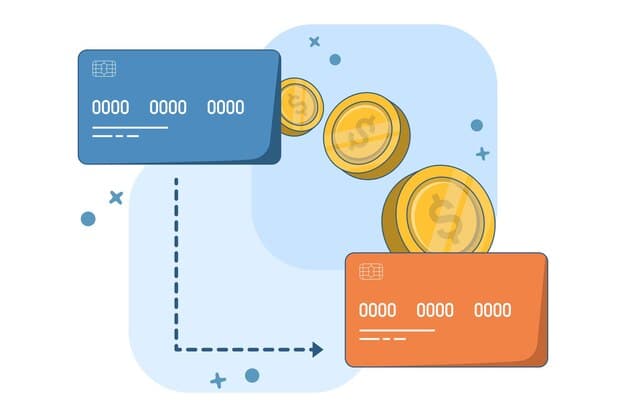How to Send Money Internationally with Crypto: A US Investor Guide

Sending money internationally using cryptocurrency offers US investors a potentially faster, cheaper, and more secure alternative to traditional methods, leveraging blockchain technology for efficient transfers.
Are you a US investor looking for a modern way to send money internationally? How to use cryptocurrency to send money internationally is a question many are asking, and this guide provides a comprehensive look at how you can leverage digital currencies for efficient and cost-effective global transfers.
Understanding Cryptocurrency for International Transfers
Cryptocurrency has emerged as a compelling alternative for international money transfers. It bypasses many of the traditional banking system’s inefficiencies, offering potentially lower fees and faster transaction times. For US investors, understanding the basics of using crypto for these transfers is crucial.
What is Cryptocurrency?
Cryptocurrency is a digital or virtual currency that uses cryptography for security. Unlike traditional currencies issued by central banks, cryptocurrencies operate on decentralized networks, typically based on blockchain technology.
- Decentralization: Cryptocurrencies are not controlled by a single entity, making them resistant to censorship and single points of failure.
- Cryptography: Cryptographic techniques secure transactions and control the creation of new units of the cryptocurrency.
- Transparency: Blockchain technology provides a transparent and immutable record of all transactions.
Benefits of Using Cryptocurrency for International Transfers
Opting for cryptocurrency over traditional methods can offer several advantages. Understanding these benefits can help US investors make informed decisions about their international money transfers.
- Lower Fees: Transaction fees are often significantly lower compared to traditional wire transfers or money transfer services.
- Faster Transactions: Crypto transactions can be processed much faster, often within minutes or hours, compared to days for traditional methods.
- Increased Security: Cryptography enhances the security of transactions, reducing the risk of fraud and theft.
In conclusion, understanding the fundamentals of cryptocurrency and its benefits is the first step for US investors looking to utilize digital currencies for international money transfers. The decentralized and secure nature of crypto offers a compelling alternative to traditional financial systems.

Setting Up a Cryptocurrency Account
Before sending money internationally with cryptocurrency, you need to set up a cryptocurrency account. This involves choosing a reputable exchange or platform and completing the necessary verification steps. For US investors, selecting a compliant and secure platform is essential.
Choosing a Cryptocurrency Exchange
Selecting the right cryptocurrency exchange is a critical step. Consider factors such as security, fees, supported cryptocurrencies, and user interface. Ensure the exchange is available and compliant in your jurisdiction.
- Security: Look for exchanges with robust security measures, such as two-factor authentication and cold storage of funds.
- Fees: Compare transaction fees, deposit fees, and withdrawal fees across different exchanges.
- Supported Cryptocurrencies: Ensure the exchange supports the cryptocurrency you intend to use for international transfers.
Verification and Compliance
Cryptocurrency exchanges are required to comply with Know Your Customer (KYC) and Anti-Money Laundering (AML) regulations. This involves verifying your identity and providing documentation.
The verification process typically involves providing personal information such as your name, address, date of birth, and government-issued ID. Some exchanges may also require proof of address, such as a utility bill or bank statement.
Funding Your Account
Once your account is verified, you need to fund it with either fiat currency (e.g., USD) or cryptocurrency. Most exchanges offer various funding methods, including bank transfers, credit/debit cards, and cryptocurrency deposits.
In summary, setting up a cryptocurrency account involves careful selection of an exchange, completing the necessary verification steps, and funding your account. By following these guidelines, US investors can establish a secure and compliant foundation for international crypto transfers.
Selecting the Right Cryptocurrency
The choice of cryptocurrency can significantly impact the cost and speed of your international transfer. Some cryptocurrencies are more suited for international transactions due to their transaction fees, speed, and stability. For US investors, understanding these factors is crucial for optimizing their transfers.
Bitcoin (BTC)
Bitcoin is the original cryptocurrency and the most widely recognized. While it offers decentralization and security, its transaction fees can be relatively high, and transaction times can vary.
Ethereum (ETH)
Ethereum is another popular cryptocurrency with a large market capitalization. Its transaction fees can also fluctuate, and transaction times can be slower during periods of high network congestion.
Stablecoins (USDT, USDC)
Stablecoins are cryptocurrencies designed to maintain a stable value, typically pegged to a fiat currency like the US dollar. They offer lower volatility and faster transaction times, making them a popular choice for international transfers.
- USDT (Tether): A widely used stablecoin pegged to the US dollar.
- USDC (USD Coin): Another popular stablecoin backed by fully reserved assets and subject to regulatory oversight.
In conclusion, understanding the characteristics of different cryptocurrencies is essential for selecting the right one for your international transfer. Stablecoins like USDT and USDC often provide the best balance of stability, speed, and cost-effectiveness.
Sending Cryptocurrency Internationally: A Step-by-Step Guide
Sending cryptocurrency internationally involves a series of steps, including obtaining the recipient’s cryptocurrency address, initiating the transfer, and confirming the transaction. For US investors, following these steps carefully ensures a smooth and secure transfer process.
Obtaining the Recipient’s Cryptocurrency Address
The first step is to obtain the recipient’s cryptocurrency address. This is a unique alphanumeric identifier that identifies the recipient’s wallet on the blockchain network. Double-check the address to prevent errors.
Initiating the Transfer
Once you have the recipient’s address, you can initiate the transfer from your cryptocurrency exchange or wallet. Enter the recipient’s address, the amount of cryptocurrency you want to send, and any other required information.
Confirm all details before submitting the transaction. Check the recipient’s address, the amount, and the transaction fee. Once the transaction is submitted, it cannot be reversed.
Confirming the Transaction
After submitting the transaction, it will be processed by the blockchain network. The transaction will be confirmed once it has been included in a block and verified by the network.
Transaction times can vary depending on the cryptocurrency and the network congestion. Some transactions may be confirmed within minutes, while others may take longer.
In summary, sending cryptocurrency internationally involves obtaining the recipient’s address, initiating the transfer, and confirming the transaction. By following these steps carefully and double-checking all details, US investors can ensure a successful and secure transfer.

Tax Implications for US Investors
Cryptocurrency transactions are subject to tax regulations in the United States. Understanding these tax implications is crucial for US investors to ensure compliance with the law.
Cryptocurrency as Property
The IRS treats cryptocurrency as property, not currency. This means that cryptocurrency transactions are subject to capital gains tax. Whenever you sell, trade, or otherwise dispose of cryptocurrency, you may incur a capital gain or loss.
Taxable Events
Several events can trigger a taxable event when using cryptocurrency. These include:
- Selling Cryptocurrency: Selling cryptocurrency for fiat currency (e.g., USD) is a taxable event.
- Trading Cryptocurrency: Trading one cryptocurrency for another is also a taxable event.
- Using Cryptocurrency to Purchase Goods or Services: Using cryptocurrency to buy goods or services is treated as selling the cryptocurrency.
Record Keeping
Keeping accurate records of your cryptocurrency transactions is essential for tax purposes. This includes:
- Date and Time of Transaction: Record the date and time of each transaction.
- Amount of Cryptocurrency: Record the amount of cryptocurrency involved in each transaction.
- Fair Market Value: Determine the fair market value of the cryptocurrency at the time of each transaction.
In conclusion, understanding the tax implications of cryptocurrency transactions is essential for US investors. Cryptocurrency is treated as property, and various events can trigger a taxable event. Keeping accurate records and consulting with a tax professional can help you comply with the law.
Risks and Considerations
While cryptocurrency offers many advantages for international money transfers, it also comes with risks and considerations that US investors should be aware of. Understanding these risks can help you make informed decisions and mitigate potential issues.
Volatility
Cryptocurrency prices can be highly volatile. The value of a cryptocurrency can fluctuate significantly in a short period, which can impact the value of your international transfer.
Security Risks
Cryptocurrency exchanges and wallets are vulnerable to security breaches and hacking attempts. Protecting your account with strong passwords and two-factor authentication is essential.
- Use Strong Passwords: Create unique and complex passwords for your cryptocurrency accounts.
- Enable Two-Factor Authentication: Use two-factor authentication to add an extra layer of security to your account.
Regulatory Uncertainty
The regulatory landscape for cryptocurrency is still evolving. Changes in regulations can impact the legality and usability of cryptocurrency in certain jurisdictions.
In summary, while cryptocurrency offers many advantages for international money transfers, it also comes with risks and considerations. Understanding these risks and taking steps to mitigate them can help US investors use cryptocurrency safely and effectively.
| Key Aspect | Brief Description |
|---|---|
| 🚀 Faster Transfers | International crypto transfers often process quicker than traditional methods. |
| 💰 Lower Fees | Crypto transactions may incur lower fees compared to traditional wire transfers. |
| 🛡️ Security Measures | Use strong passwords and two-factor authentication for secure crypto transactions. |
| ⚖️ Tax Implications | Cryptocurrency transactions are taxable events; keep accurate records. |
Frequently Asked Questions (FAQ)
▼
Yes, it is legal, but you must comply with US regulations, including reporting requirements to the IRS. Check both US and the recipient country’s regulations.
▼
Stablecoins like USDT and USDC are often preferred due to their stability and relatively low transaction fees. Bitcoin and Ethereum can also be used, but fees might be higher.
▼
Research exchanges for security measures like two-factor authentication and cold storage. Read reviews and check compliance in your area before deciding.
▼
The IRS treats cryptocurrency as property. Selling, trading, or using it triggers taxable events. Keep detailed records for tax reporting and seek professional advice.
▼
Use secure exchanges, enable two-factor authentication, and research the crypto’s volatility. Always double-check the recipient’s address and be aware of current regulations.
Conclusion
In conclusion, leveraging cryptocurrency for international money transfers presents a compelling alternative for US investors seeking efficiency and cost savings. By understanding the nuances of selecting the right cryptocurrency, setting up secure accounts, and adhering to regulatory guidelines, you can navigate the world of digital finance and streamline your international transactions effectively.





